What Are Vitamins?
Vitamins are organic molecules that are required by the body in small amounts for normal functioning. They play an important role in many bodily processes, such as metabolism, immunity, and growth and development. Vitamins are essential for good health, but the body cannot produce them on its own – they must be obtained from food sources.
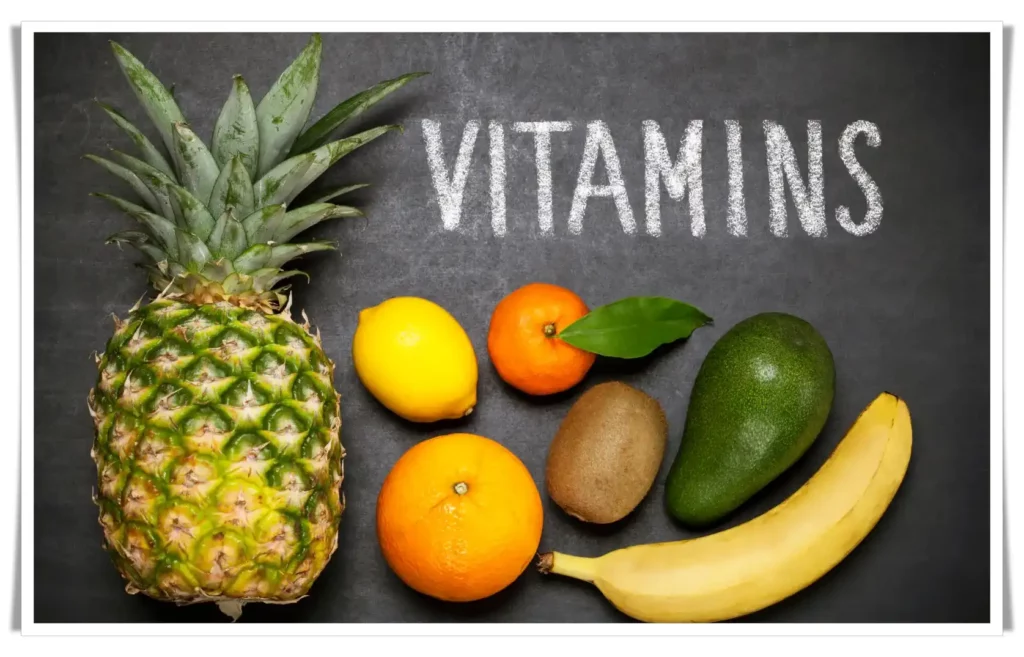
What Are Vitamins?
There are 13 essential vitamins that humans need to obtain from their diet, including vitamins A, C, D, E, K, and the B vitamins (thiamine, riboflavin, niacin, pantothenic acid, biotin, vitamin B6, vitamin B12). Each vitamin has a specific role in maintaining good health; for example, Vitamin A is important for eye health and vision; Vitamin D helps regulate calcium levels in the body; and Vitamin C supports immune function. Getting enough of these essential vitamins is key to staying healthy.
What Are Vitamins and What Is Their Role In the Body?
Types of Vitamins
- Vitamin A
- Vitamin C
- Vitamin D
- Vitamin E
- Vitamin K
- Vitamin B1 (thiamine)
- Vitamin B2 (riboflavin)
- Vitamin B3 (niacin)
- Vitamin B6
- Vitamin B12
- Folic acid
- Biotin
- Pantothenic acid
Vitamin A
Vitamin A was given the first letter of the alphabet as a name because it was the first vitamin to be discovered. It was found that vitamin A has a large number of uses in the body including keeping eyes healthy, aiding cell growth, and also helping boost the immune system. However, vitamin A is not only absorbed directly but it is also created by the body by converting beta carotene into vitamin A.
Food for a Healthy Life - Free eBook

What Are Vitamins?
Vitamin A itself is found in a number of foods such as eggs, milk, liver, and meat. Beta carotene that the body can convert into vitamin A is found in many fruits and vegetables, especially red, orange, and green colored ones. The most important point to remember is that consuming too much pure vitamin A can be toxic. It is essential not to exceed the recommended daily allowance for vitamin A.
The actual recommended allowance of vitamin A varies depending on a person’s age, sex, and other factors. While the actual amount of vitamin A consumed may be toxic if the recommended daily allowance is exceeded, there is a far higher limit to how much beta-carotene can be consumed. Therefore it is advisable to concentrate on obtaining the greatest amount of beta carotene which the body can then convert to vitamin A, rather than consuming vast quantities of pure vitamin A-rich foods.
What Are Vitamins and What Is Their Role In the Body?
Many people will remember being told that eating lots of carrots helps you to see in the dark and that is down to the vitamin A that is produced from the high levels of beta-carotene that are found in the vegetables. Other foods which have high levels of beta carotene that can be converted to vitamin A include tomatoes and dark green leafy vegetables, such as spinach.
Please watch the video: What Are Vitamins and What Is Their Role In the Body?

What Are Vitamins?
Beta carotene is not only used to form vitamin A, but it is also a powerful antioxidant in itself. None of the beta carotenes that are absorbed is wasted as any excess after conversion to vitamin A has taken place is used to fight the harmful free radicals within the body. Vitamin A also helps fight infections and illnesses by helping tissues that line various parts of the body, including the eyes, mouth, nose, throat, and lungs, to grow and also to repair them if they are damaged to prevent infection. Children also need plenty of vitamin A to help their bones and teeth to develop properly.
Vitamin C
C vitamin has got to be the most widely known vitamin these days. It is not surprising because the body needs c vitamin for over 300 functions. In fact, C vitamin has been proven to help protect against heart disease, cancer, and other serious illnesses. Without the C vitamin, the body would not be able to heal itself either.
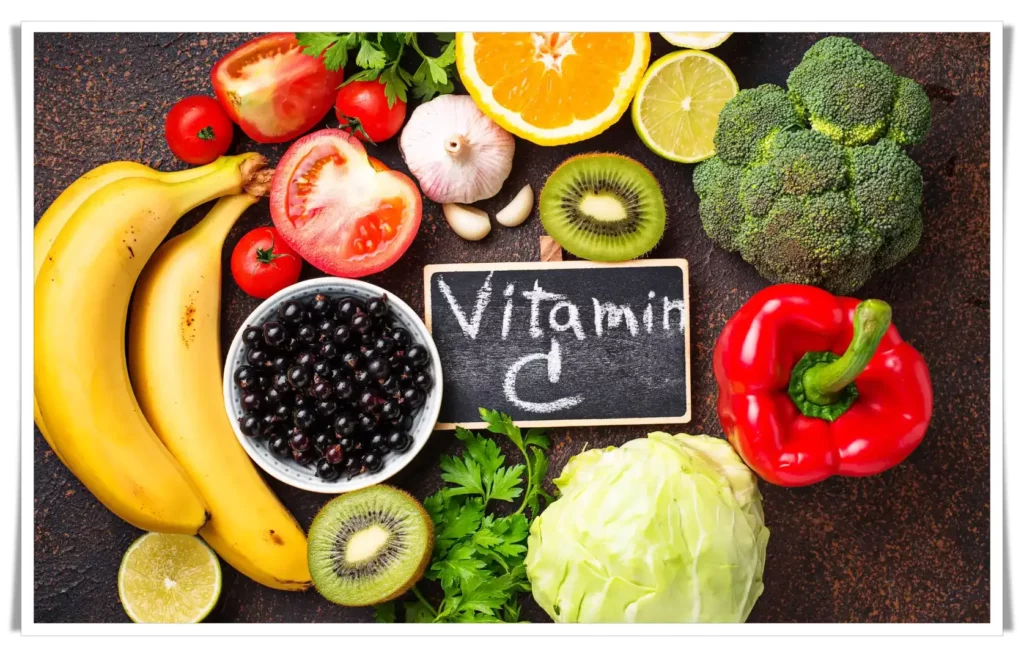
What Are Vitamins?
This is because the C vitamin is vital for the formation of collagen. Whenever a person has a cut or an injury it is the collagen that helps repair the damage and without sufficient C vitamin, this would be almost impossible. Collagen has a multitude of functions in the body, including keeping the organs in place, and it would not be able to do this without sufficient c vitamin.
C vitamin is also an antioxidant for the body and helps other vitamins and minerals to be absorbed better. Folic acid and iron, for example, need the C vitamin to maximize their usefulness. The more C vitamin the body has, the better its defense against colds and other common ailments the C vitamin may not prevent a person from catching a virus but it does help speed up the recovery process.
There is C vitamin in almost every fruit and vegetable but some have far higher c vitamin content than others. Cranberries and melons have high c vitamin content. In fact, tropical fruits have the highest c vitamin amounts of all fruit. Hot peppers are amongst the richest sources of C vitamin when it comes to vegetables.
Heal Yourself - Free eBook

What Are Vitamins?
The hotter the pepper, the higher its c vitamin content is. Unfortunately, the c vitamin is water soluble so many vegetables lose their effectiveness as a c vitamin provider if they are boiled for a long time. Steaming or quick stir frying vegetables ensures that more of their c vitamin content is retained. The recommended daily amount of C vitamin is easily obtained from eating five portions of fruit and vegetables a day if they are consumed raw or cooked quickly.
C vitamin supplements are extremely useful to ensure that people obtain sufficient C vitamins. However, with a balanced diet, the amount of c vitamin the body receives is likely to be sufficient. However, if a person begins feeling tired or lethargic then a c vitamin supplement will help overcome this. There is no danger of having too much C vitamin as the body simply excretes the excess.
Vitamin D
The D vitamin is the only vitamin that is not obtained from foods that are consumed. Instead, D vitamin is actually obtained by sunlight on the skin. There has been a lot of media coverage about the dangers of getting too much sun but it is essential that the skin is exposed to sunlight to obtain the recommended daily allowance of the D vitamin.
Please watch the video: What Are Vitamins and What Is Their Role In the Body?
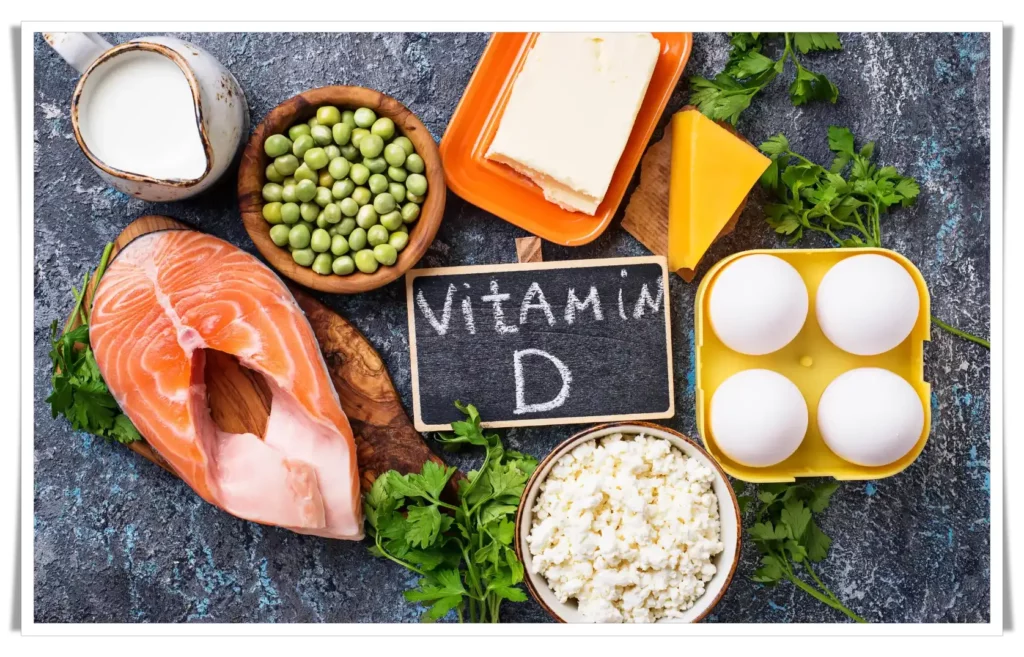
What Are Vitamins?
In reality, the amount of time that a person has to spend in the sun to receive a sufficient dose of the D vitamin is extremely small and just a few minutes a day will be sufficient and not have any adverse effects from the amount of ultraviolet light received.
The most important function of the D vitamin is to help control how much calcium is absorbed from food. The majority of the calcium is used to build strong teeth and bones but it is also needed to send messages along the nerves and to help muscles, such as the heart muscles, to contract. It is the D vitamin that ensures that there is always sufficient calcium in the blood to perform these tasks.
Other functions that require the D vitamin relate to the immune system and it is believed that it is also a contributing factor in reducing the risk of contracting cancer and, in particular, colon cancer.
The variant of the D vitamin that is formed under the skin is known as vitamin D3 or cholecalciferol. This D vitamin is created when the ultraviolet in the sunlight reacts with a type of cholesterol that is found under the skin naturally. The D3 is converted into a more active form of D vitamin in the liver and is then diverted to where it is needed the most. Some of the D vitamin remains in the liver and kidneys to help reabsorb the calcium from the blood.
What Are Vitamins and What Is Their Role In the Body?

What Are Vitamins?
The rest of the D vitamin is dispersed to the bones to help them retain their calcium and the intestines to aid the absorption of calcium from food.
Even though the majority of the D vitamin is formed through the exposure of the skin to sunlight there are some foods that do contain some of the vitamins naturally. This form of the D vitamin is known as vitamin D2 or ergocalciferol. This is used in the same way as the other D vitamins and is the type used to create the majority of D vitamin supplements.
Vitamin E
E vitamin is extremely important for a variety of functions in the body. A healthy heart needs plenty of the e vitamin as it has been shown to actually prevent heart disease. The E vitamin can also help contain any existing heart disease and stop it from getting worse.
E vitamin is also vital in protecting the cell membranes from the harmful free radicals that are present in the body. Without E vitamin, amongst others, the cell membranes would be damaged and this could lead to serious health problems, including cancer. The reason that the E vitamin is so effective against free radicals is that it is fat soluble so it can be absorbed into the cell membranes. The E vitamin is therefore essential for the immune system.
Please watch the video: What Are Vitamins and What Is Their Role In the Body?
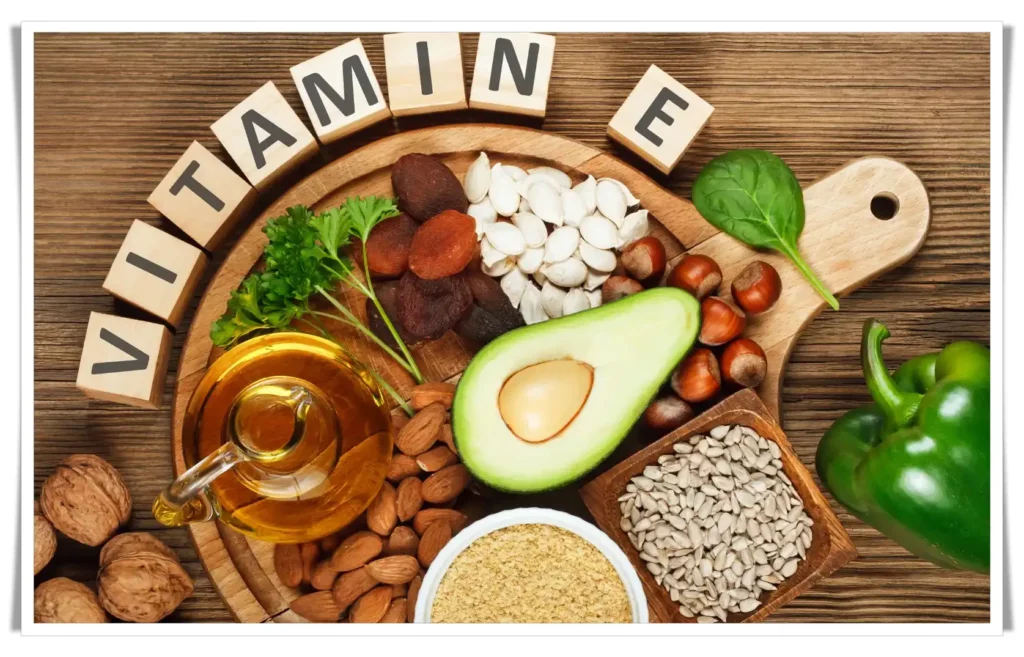
What Are Vitamins?
The recommended daily amount of the E vitamin that a person requires depends on their body weight. This is connected to the fact that the more fat a diet contains then the more of the e vitamin that is needed. However, the only foods that really contain any reasonable amount of the E vitamin are vegetable oils, seeds, wheat germ, and nuts. It is for this reason that most people should take some form of E vitamin supplement.
A deficiency of the E vitamin does not affect a person immediately. In fact, it can take months for the effects of insufficient E vitamin to be detected. After years of E vitamin deficiency, there may e some detectable damage to the nerves of the spinal cord or retina of the eye but this is very rare. Most people obtain enough E vitamin from a normal diet but it is essential that the food that a person eats contains a little fat to help with the absorption of the e vitamin.
There are a few medical conditions that may lead to a deficiency of the e vitamin and may require the person to take E vitamin supplements. Cystic fibrosis causes a person to be unable to digest fats well which leads to less of the E vitamin being absorbed. Crohn’s disease causes lower absorption rates of the e vitamin and a supplement may be necessary.
What Are Vitamins and What Is Their Role In the Body?

What Are Vitamins?
Some forms of liver disease can also lead to problems absorbing the e vitamin, especially through the intestine. Of course, as fat is required to help absorb sufficient amounts of the E vitamin, anyone on an extremely low-fat diet will need to discuss their options for increasing the amount of e vitamin that their body needs.
Vitamin K
K vitamin is essential for the blood to clot to repair injuries. Whenever a person has a bleeding wound, it is the K vitamin that is present in the blood that stops the bleeding and enables most minor cuts to heal quickly.
What Are Vitamins and What Is Their Role In the Body?
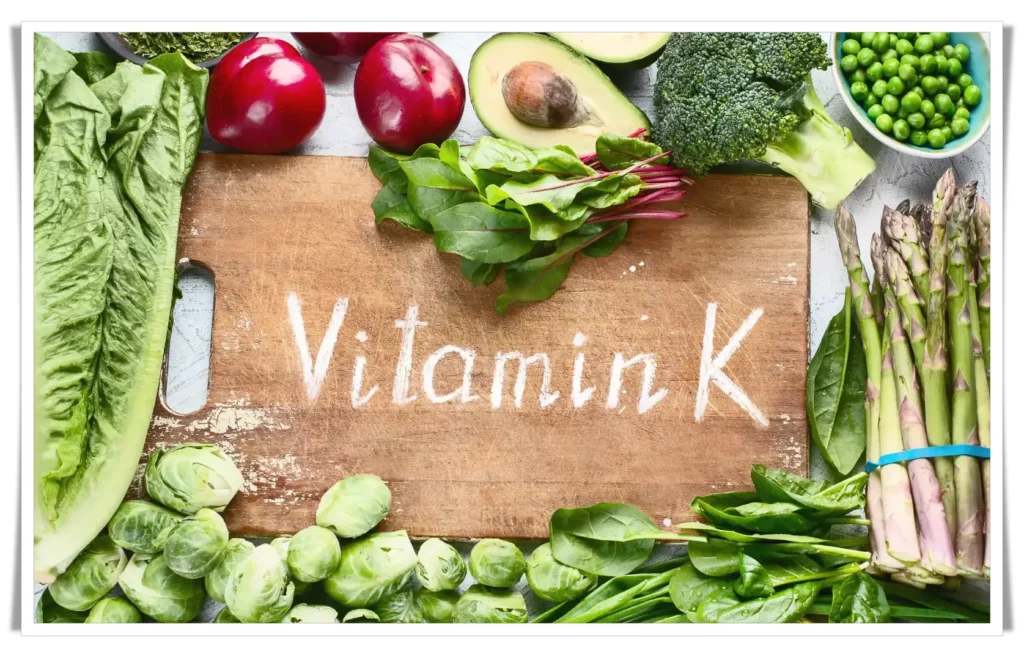
What Are Vitamins?
There are three different forms of the K vitamin. The first variant of the K vitamin is vitamin K1, also known as phylloquinone. This is the form of the K vitamin that is found in types of plant foods. Vitamin K is found in plant foods. The second form of K vitamin is vitamin K2 or menaquinone.
This type of the K vitamin is formed by friendly bacteria in the intestines. Thirdly, there is vitamin K3 which is also known as menadione and is actually an artificial form of the K vitamin. All three of these types of K vitamin end up in the liver where it is used to create blood clotting substances.
The best natural sources of the K vitamin are green leafy vegetables, such as spinach. However, because the friendly bacteria in the intestine make one of the forms of the K vitamin it is extremely rare for a person to have a deficiency of the K vitamin and so K vitamin supplements are not needed by the majority of people.
Apart from the main function of helping blood to clot, the K vitamin, specifically Vitamin K1, has an important part to play in the bone-building process. This K vitamin is required to retain the calcium in the bones and redistribute it to where it is needed.
What Are Vitamins and What Is Their Role In the Body?

What Are Vitamins?
Although a K vitamin deficiency is relatively rare there are certain groups of people who may suffer from it. Newborn babies may not have enough of the K vitamin as they have insufficient bacteria in their intestines to produce it. The majority of newborn babies in developed countries are therefore given a K vitamin injection to tide them over until the natural process takes over.
That is the only time that a K vitamin supplement will be taken by most people throughout their lives. However, an extended course of antibiotics may lead to a K vitamin deficiency due to the fact that the antibiotics kill the intestinal bacteria as well as the ones that they are being taken to cure. Again, a K vitamin supplement may be given if the course of antibiotics has to continue for a long period of time.
Vitamin B1
Vitamin B1, also known as thiamine, is a water-soluble vitamin that plays an important role in energy metabolism, particularly in the metabolism of carbohydrates. It is also necessary for the proper functioning of the nervous system and helps to maintain the health of the heart and other muscles.
Diet and Nutrition for the 21st Century - Free eBook
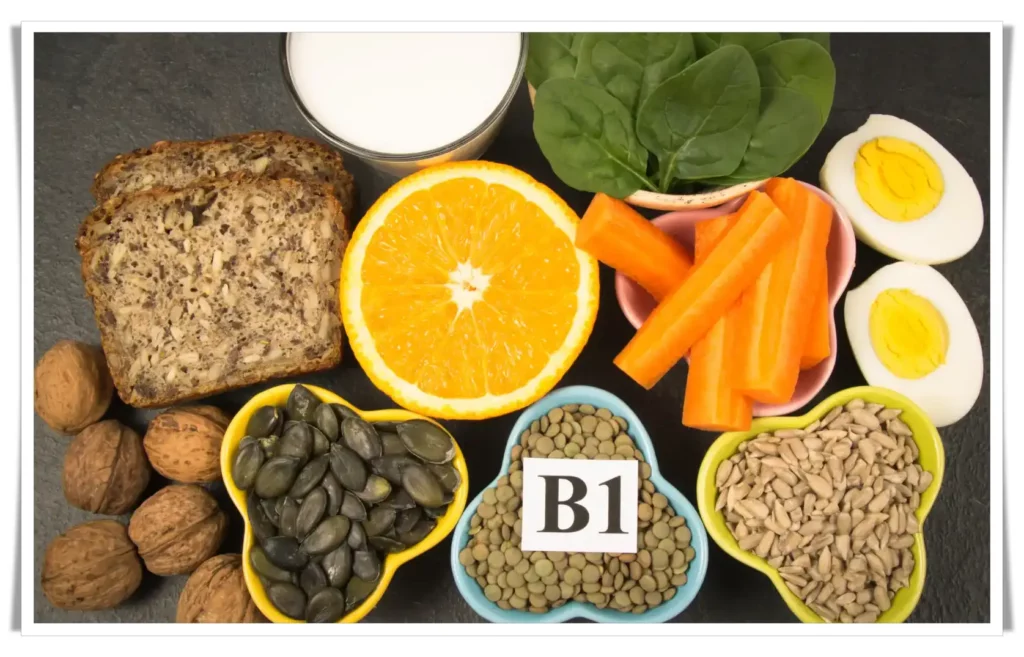
What Are Vitamins?
B1 vitamin can be found in a wide variety of foods, including whole grains, nuts, seeds, and legumes, as well as in fortified foods such as cereals and bread. Pork, organ meats, and yeast are also good sources of vitamin B1.
The benefits of vitamin B1 for the body include:
- Helps to convert food into energy.
- Maintaining healthy nerve function.
- Supports healthy heart function.
- Helps the body to produce red blood cells.
- Essential for normal growth and development
- May help to reduce symptoms of anxiety and depression
- Helps to prevent or treat certain types of anemia.
What Are Vitamins and What Is Their Role In the Body?
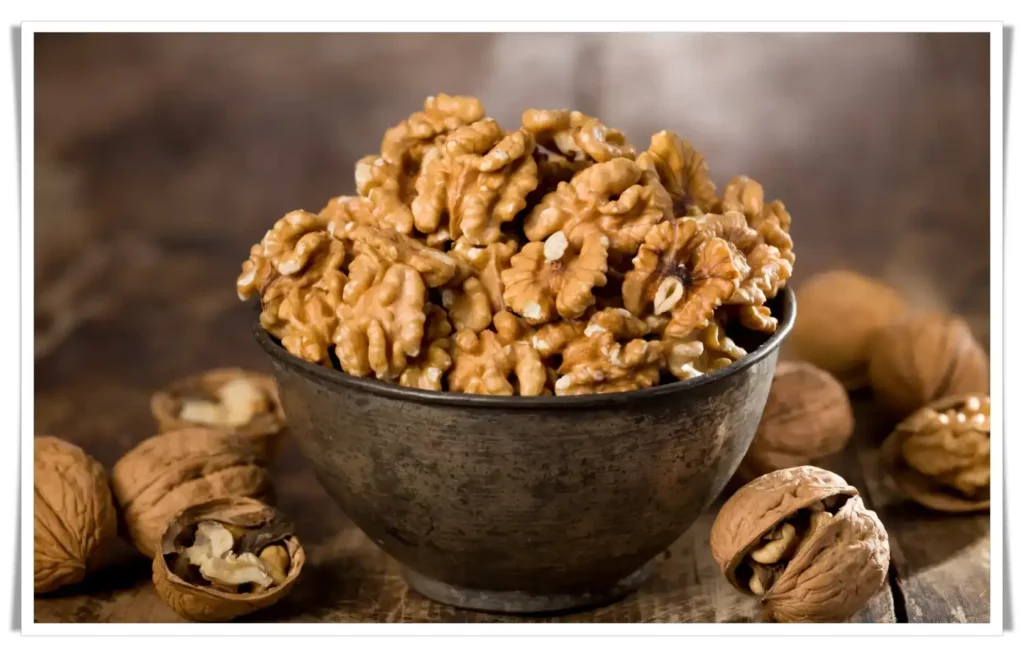
What Are Vitamins?
It's important to note that a deficiency of vitamin B1 can lead to a condition called beriberi, which can cause symptoms such as fatigue, muscle weakness, and nerve damage.
Vitamin B2
Vitamin B2, also known as riboflavin, is a water-soluble vitamin that plays a vital role in energy production and the metabolism of carbohydrates, proteins, and fats. It's also important for the health of the skin, hair, and nails, and for maintaining good vision.
What Are Vitamins and What Is Their Role In the Body?
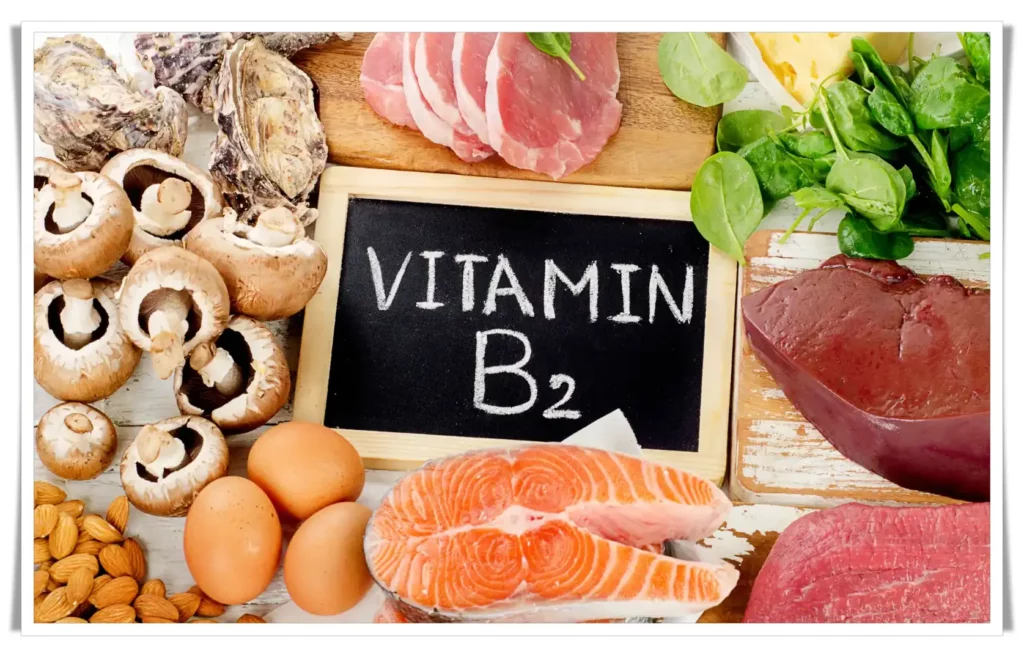
What Are Vitamins?
Vitamin B2 can be found in a variety of foods including:
- Dairy products such as milk, yogurt, and cheese
- Eggs
- Meat and poultry
- Fish
- Nuts and seeds
- Leafy green vegetables
- Fortified cereals, bread, and pasta
What Are Vitamins and What Is Their Role In the Body?

What Are Vitamins?
The benefits of Vitamin B2 for the body include:
- Helps to convert food into energy.
- Necessary for healthy skin, hair, and nails.
- Maintaining good vision
- Needed for proper growth and development
- Helps to prevent or treat certain types of anemia.
- Helps to prevent migraines.
- Supports healthy immune system function.
A deficiency of Vitamin B2 can lead to symptoms such as sore throat, cracked lips, sores in the corners of the mouth, and anemia.
Vitamin B3
Vitamin B3, also known as niacin, is a water-soluble vitamin that plays a role in energy production, DNA repair, and the metabolism of carbohydrates, proteins, and fats. It's also important for maintaining the health of the skin, nerves, and digestive system.
What Are Vitamins and What Is Their Role In the Body?
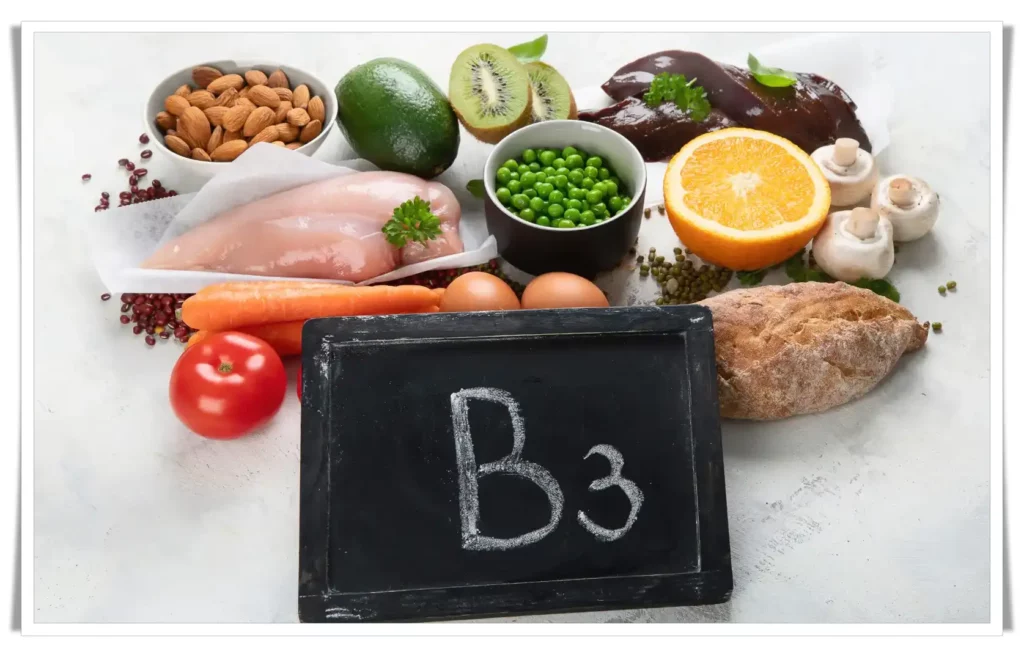
What Are Vitamins?
Vitamin B3 can be found in a variety of foods including:
- Meat and poultry
- Fish
- Nuts, particularly peanuts
- Legumes such as peas and beans
- Whole grains
- Eggs
- Milk and dairy products
What Are Vitamins and What Is Their Role In the Body?

What Are Vitamins?
The benefits of Vitamin B3 for the body include:
- Helps to convert food into energy
- Helps to lower cholesterol levels and reduce the risk of heart disease
- Helps to improve circulation
- Helps to prevent or treat certain types of anemia
- Helps to support healthy skin and nerves
- Helps to improve digestion
- Helps to prevent certain types of cancer
A deficiency of Vitamin B3 can lead to symptoms such as pellagra, a condition characterized by skin problems, diarrhea, and dementia.
Vitamin B5
The B5 vitamin is also known as Pantothenic Acid. The B5 vitamin is the most prolific of all the vitamins and is found in every type of food. In fact, it is impossible for a person to consume less B5 vitamin than they need. That means that there is no little possibility that a person can have a B5 vitamin deficiency. For this reason, there is actually no recommended daily amount that health professionals can state as everyone obtains more than enough from their normal food consumption.
What Are Vitamins and What Is Their Role In the Body?
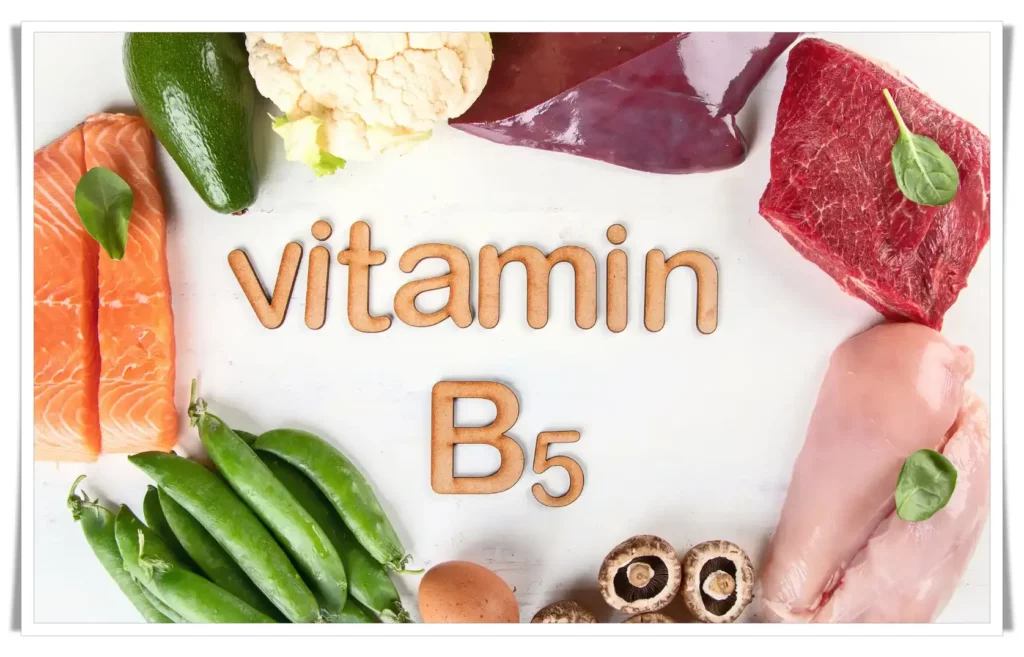
What Are Vitamins?
However, even though there is no need to calculate a recommended daily allowance it does not mean that the B5 vitamin is not vital for a healthy body and mind. In fact, the B5 vitamin is essential for turning food into energy amongst other functions. The B5 vitamin is responsible for taking the fats and carbohydrates into energy.
Some B5 vitamins can be found in almost every food whether it is animal or vegetable. Obviously, there are some sources of the B5 vitamin that are better than others but a balanced diet will provide more than enough. The foods with the highest B5 vitamin content are organ meats, salmon, eggs, beans, milk, and whole grains. It is worth noting that the B5 vitamin is lost when grains are milled into flour and tends not to bead back in. Therefore, processed grain foods such as bread, pasta, rice, breakfast cereal, and baked goods are not good sources of the B5 vitamin.
Vitamin B5 can be found in a variety of foods including:
- Meat, poultry, fish, and eggs
- Whole grains
- Legumes such as peas and beans
- Nuts and seeds
- Milk and dairy products
- Fruits and vegetables, particularly mushrooms, avocado, and sweet potatoes
The benefits of Vitamin B5 for the body include:
- Helps to convert food into energy
- Helps to support healthy skin and hair
- Helps to reduce stress and fatigue
- Helps to support healthy digestion
- Helps to support healthy nerve function
- Helps to regulate the synthesis of hormones and neurotransmitters
- Helps to lower cholesterol levels
A deficiency of Vitamin B5 is rare and usually occurs as a result of an underlying condition or as a side effect of certain medications. Symptoms of deficiency can include fatigue, muscle weakness, and numbness and tingling in the hands and feet.
What Are Vitamins and What Is Their Role In the Body?

What Are Vitamins?
The B5 vitamin is the most effective when it is combined with other B vitamins especially thiamin or B1, riboflavin or B2, niacin or B3, pyridoxine or B6, and biotin. Along with these other B vitamins, the B5 vitamin is an integral part of a number of processes. The most important of these is the production of energy from food that is consumed and this is known as Kreb’s cycle. The B5 vitamin is also required for releasing energy from fats.
Interestingly, the B5 vitamin is also considered to be helpful in reducing stress. This is chiefly due to the fact that during periods of stress, the body produces more of certain hormones such as adrenalin and these require the B5 vitamin. There are many theories as to the benefits of the B5 vitamin but there is no need for the majority of people to actively seek out foods that are high in B5 as they are likely to be consuming far more than is needed already. There are no adverse effects to consuming too much B5 vitamin.
Vitamin B6
The B6 vitamin, also known as pyridoxine, is one of the most versatile of the B vitamins and yet the body only requires a relatively small amount. The B6 vitamin works closely with all the other B vitamins, especially niacin, folic acid, and Cobalamin, and contributes to numerous functions in the body.
What Are Vitamins and What Is Their Role In the Body?
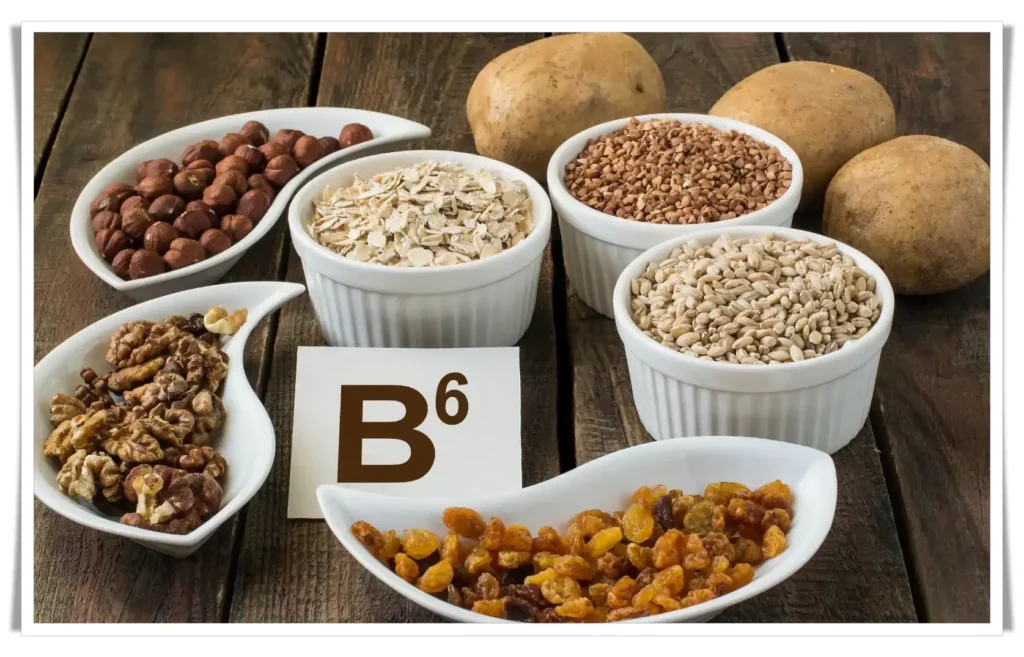
What Are Vitamins?
Amino acids are converted by the B6 vitamin into proteins and it is also required for transforming stored sugar within the body into essential energy. Basically, the B6 vitamin is essential for converting the proteins that are consumed into proteins that the body needs and also for converting the carbohydrates from the form that they are stored in the body to a form that can be used for extra energy.
The body requires a number of different proteins and it is the B6 vitamin that ensures that the correct forms are available. For example, the B6 vitamin will create hemoglobin for carrying oxygen in the blood cells, hormones for regulating blood pressure, neurotransmitters, and various enzymes.
The recommended daily allowance for the B6 vitamin is only around 2.0mg but this seemingly insignificant amount is used extremely efficiently within the body to produce over sixty different enzymes. The best sources of the B6 vitamin are high-protein foods such as eggs, fish, poultry, and meat and it is also added to breakfast cereals and bread to ensure that everyone is able to consume their recommended daily allowance, even if they do not eat meat products.
What Are Vitamins and What Is Their Role In the Body?
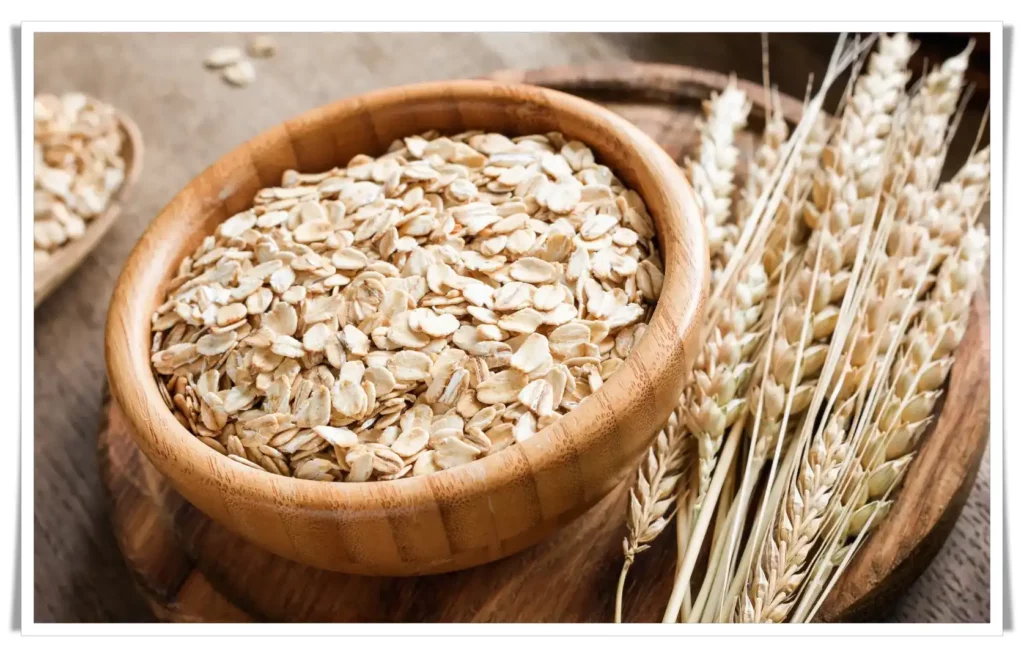
What Are Vitamins?
An additional amount of the b6 vitamin may be beneficial for the heart and immune system. B6 vitamin supplements are sometimes required by asthmatics and diabetics. However, it is important to be aware that large doses of the B6 vitamin can be toxic.
As the B6 vitamin is found in many common foods the majority of people receive sufficient amounts of the vitamin from their normal diet. There are some groups that may need to take a B6 vitamin supplement to ensure that they obtain the recommended daily allowance.
For example, pregnant or breastfeeding women will need a slightly higher amount of the B6 vitamin to allow for the amount of the vitamin that is being absorbed by the baby although it is possible to obtain the extra B6 vitamin from increased consumption of high-protein foods. Strict vegetarians or vegans, however, and children who do not eat animal products may need a B6 vitamin supplement as vegetables and fruits are poor sources of the B6 vitamin.
Vitamin B6 can be found in a variety of foods including:
- Meat, poultry, fish, and eggs
- Whole grains
- Legumes such as peas, beans, and lentils
- Nuts and seeds
- Fruits and vegetables, particularly bananas, avocados, and potatoes
The benefits of Vitamin B6 for the body include:
- Helps to convert food into energy
- Helps to support healthy immune and nervous systems
- Helps to form red blood cells
- Helps to produce neurotransmitters
- Helps to reduce symptoms of morning sickness in pregnant women
- Helps to reduce symptoms of depression and anxiety
- Helps to reduce symptoms of premenstrual syndrome (PMS)
A deficiency of Vitamin B6 can lead to symptoms such as anemia, skin conditions, and a weakened immune system. It can also cause nerve damage, confusion, depression, and irritability.
Vitamin B9
Vitamin B9, also known as folate or folic acid, is a water-soluble vitamin that plays a vital role in cell growth and the formation of red blood cells. It is also essential for the proper functioning of the nervous system and is important for pregnant women as it helps to prevent birth defects in the baby's brain and spine.
What Are Vitamins and What Is Their Role In the Body?
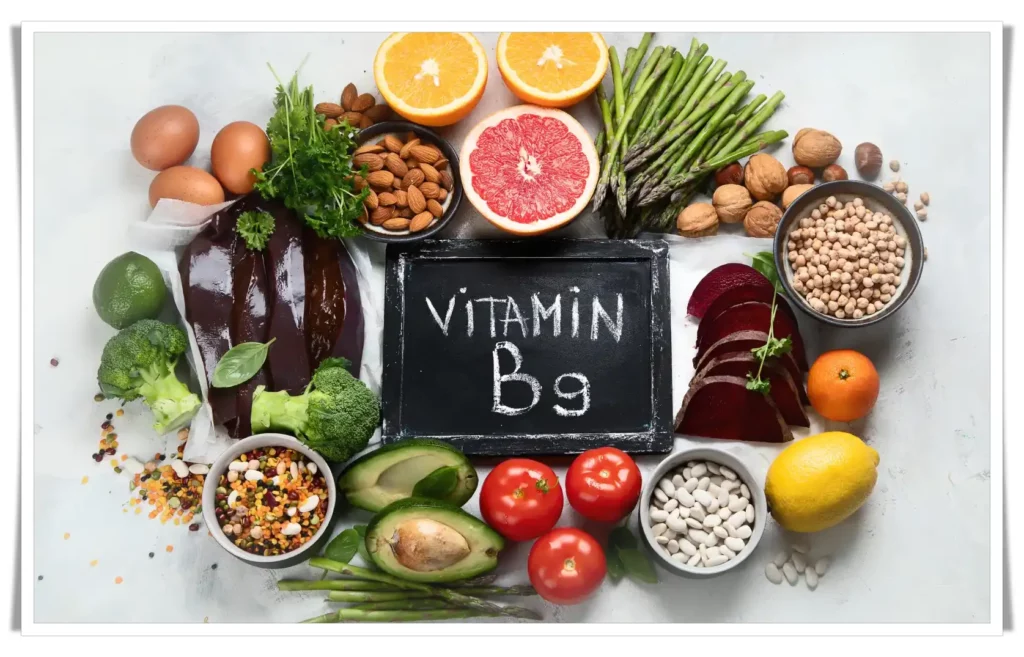
What Are Vitamins?
Vitamin B9 can be found in a variety of foods including:
- Leafy green vegetables such as spinach and broccoli
- Citrus fruits
- Fortified cereals and bread
- Legumes such as peas, beans, and lentils
- Eggs
- Meat, particularly liver
The benefits of Vitamin B9 for the body include:
- Helps to form red blood cells
- Helps to prevent birth defects
- Helps to produce DNA
- Helps to support healthy cell growth
- Helps to lower the risk of heart disease
- Helps to lower the risk of certain types of cancer
- Helps to reduce symptoms of depression and anxiety
What Are Vitamins and What Is Their Role In the Body?

What Are Vitamins?
A deficiency of Vitamin B9 can lead to symptoms such as anemia, fatigue, and a weakened immune system. It can also cause birth defects in unborn babies.
Vitamin B12
The B12 vitamin is just one of the essential b vitamins that are needed to maintain a healthy body and mind. Cobalamin is the alternative name for the B12 vitamin. The body needs the B12 vitamin for a number of different processes including converting the fats, carbohydrates, and proteins from all food that is consumed into energy. One of the most important processes that B12 is essential for is to create healthy red blood cells.
What Are Vitamins and What Is Their Role In the Body?
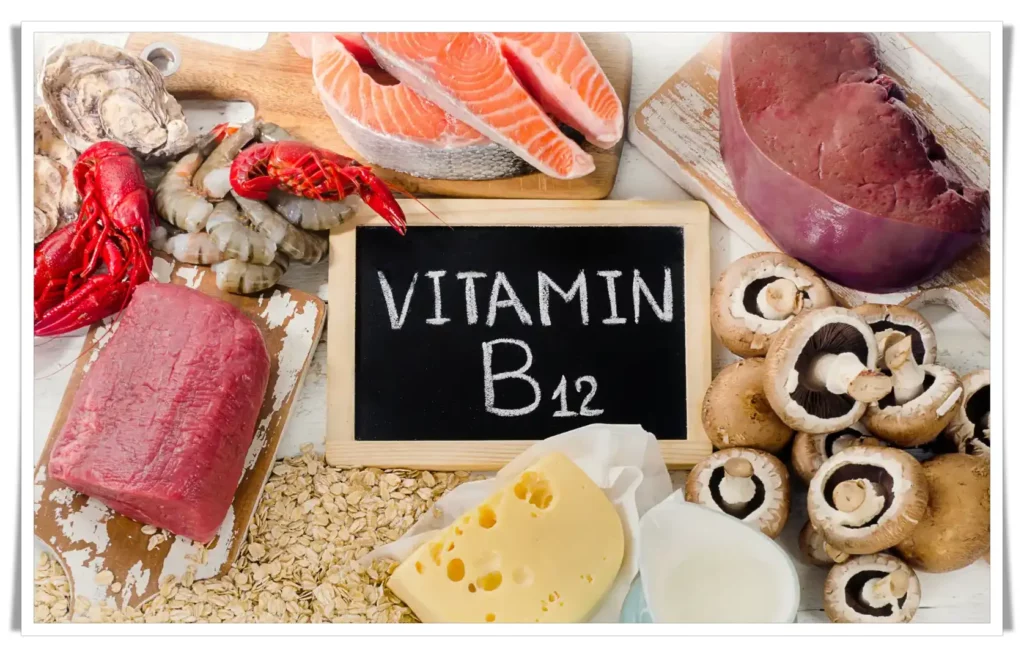
What Are Vitamins?
The prevention of heart disease relies on the production of healthy blood cells and therefore the B12 vitamin is vital. The B12 vitamin is also vital for keeping the immune system functioning at its maximum efficiency. Not only this, but the B12 vitamin also works to form the protective covering of all the nerve cells in the body.
The production of red blood cells is not the only type of cells that the B12 vitamin is essential. In fact, all of the cells in the body require the B12 vitamin, including white blood cells and nerve cells. The white blood cells are an important part of the immune system and without the B2 vitamin, the effectiveness of the immunity of the body to germs and viruses is heavily reduced. The nerve cells need the B12 vitamin to create the fatty layer that will protect them from damage. The brain cells are particularly open to disease and damage if there is not enough B12 vitamin present to form this protective layer.
Even though the B12 vitamin is involved in so many essential processes the actual recommended daily amount that a body needs is quite small. The fact is that the majority of people consume much more of the B12 vitamin than their body actually requires. The only issue is that the body cannot absorb the B12 vitamin very easily and has to create its own aid to the process.
What Are Vitamins and What Is Their Role In the Body?

What Are Vitamins?
The intrinsic factor that the body produces helps the body to absorb the B12 vitamin that it needs from food but this still amounts to only half of the total B12 vitamin available. A deficiency in the B12 is extremely rare in most people and is made even less likely because the body can recycle the B12 vitamin that it already has absorbed.
A few groups of people may develop anemia due to a lack of B12 vitamin in their diet. Young children often have a problem getting enough of the B12 vitamin because they may be extremely fussy eaters and it is important to encourage them to eat as wide a variety of foods as possible. This is not only the case with the B12 vitamin but is true for all essential vitamins and minerals.
Vitamin B7
Biotin, also known as vitamin H or vitamin B7, is a water-soluble vitamin that plays a role in the metabolism of carbohydrates, fats, and proteins. It is also important for maintaining the health of the skin, hair, and nails, and for the proper function of the nervous system. Biotin helps in the production of energy from food, and also helps to transfer carbon dioxide.
What Are Vitamins and What Is Their Role In the Body?

What Are Vitamins?
Biotin can be found in a variety of foods including:
- Eggs
- Meat and poultry
- Fish
- Nuts, particularly almonds and walnuts
- Legumes such as peas and beans
- Dairy products
- Whole grains
What Are Vitamins and What Is Their Role In the Body?

What Are Vitamins?
The benefits of Biotin for the body include:
- Helps to convert food into energy
- Helps to support healthy skin, hair, and nails
- Helps to maintain healthy nerve function
- Helps to support healthy immune system function
- Helps to transfer carbon dioxide
- Helps to prevent or treat certain types of anemia
A deficiency of biotin is rare but can lead to symptoms such as skin rash, dry eyes, hair loss, and a tingling sensation in the arms and legs.
The Different Types of B Vitamins
There are a large number of B vitamins that are needed to keep all of the body functions performing properly. All of the B vitamins are essential for a number of different processes. Without sufficient B vitamins, the blood supply would not be healthy and this leads to a variety of illnesses and diseases.
What Are Vitamins and What Is Their Role In the Body?
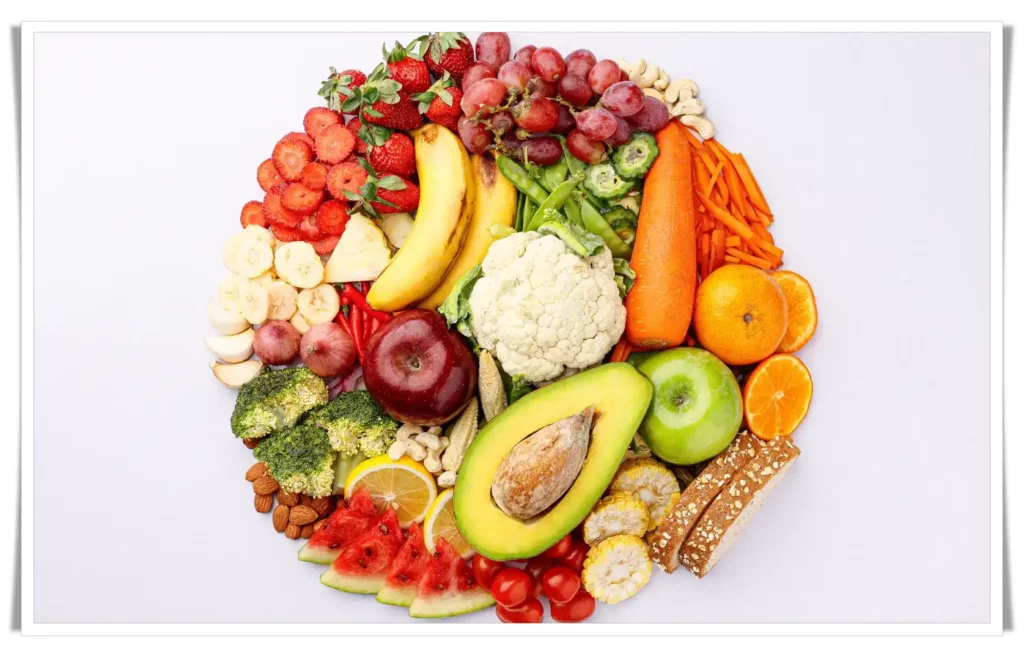
What Are Vitamins?
The brain needs B vitamins to function correctly and the heart also needs B vitamins to stay healthy and prevent heart disease food is broken down into various nutrients by B vitamins. In fact, just about every organ and process within the body requires at least one form of B vitamin.
Thiamin, or B1, is the B vitamin that the body needs to keep all of its cells, especially the nerves, functioning correctly. It is especially important for memory and general mental health and is one of the B vitamins that is required to convert food into energy.
Riboflavin, or B2, is the B vitamin that is essential for releasing the energy from food that has been consumed. Without this B vitamin, the body cannot grow or develop properly and red blood cells will not be as healthy as they should be.
What Are Vitamins and What Is Their Role In the Body?
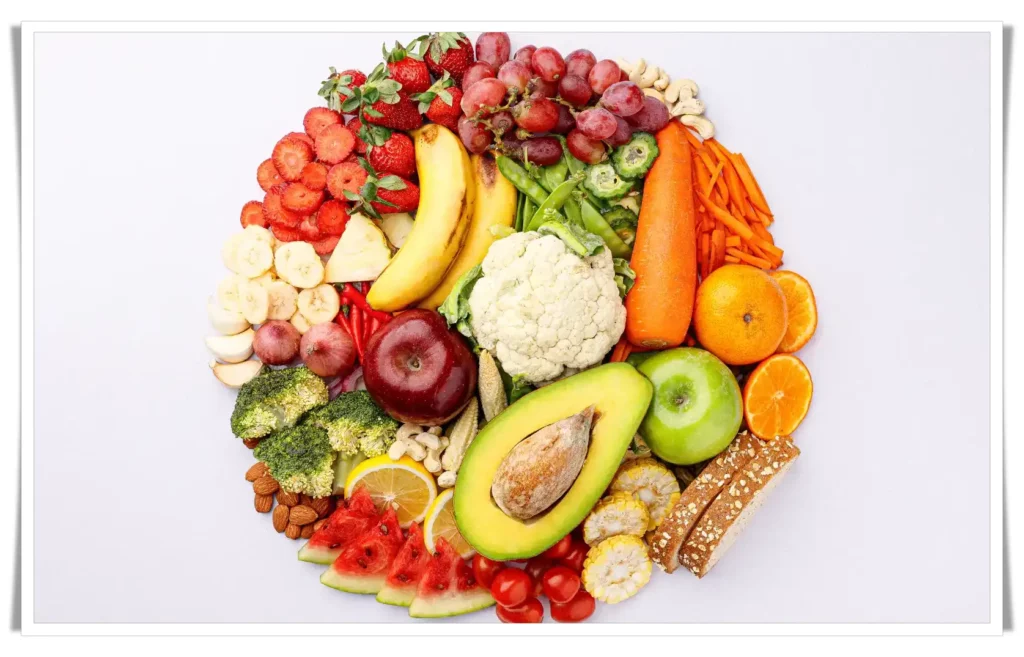
What Are Vitamins?
Niacin, or B3, is the B vitamin that is involved in over fifty processes, ranging from detoxifying chemicals to making hormones and releasing energy from food.
Pantothenic acid, or B5, works with several other B vitamins for a number of essential processes including breaking down fats, proteins, and carbohydrates into energy, and is also the B vitamin that is needed to form vitamin D, a variety of hormones, and red blood cells.
Pyridoxine, or B6, is the B vitamin that is largely responsible for redistributing the amino acids to create over five thousand proteins that are needed by the body and is also one of the B vitamins needed to form various enzymes.
Biotin, or B7, is one of the B vitamins that are involved in a number of processes within the body, including the breaking down of fats, carbohydrates, and proteins into usable energy forms.
What Are Vitamins and What Is Their Role In the Body?
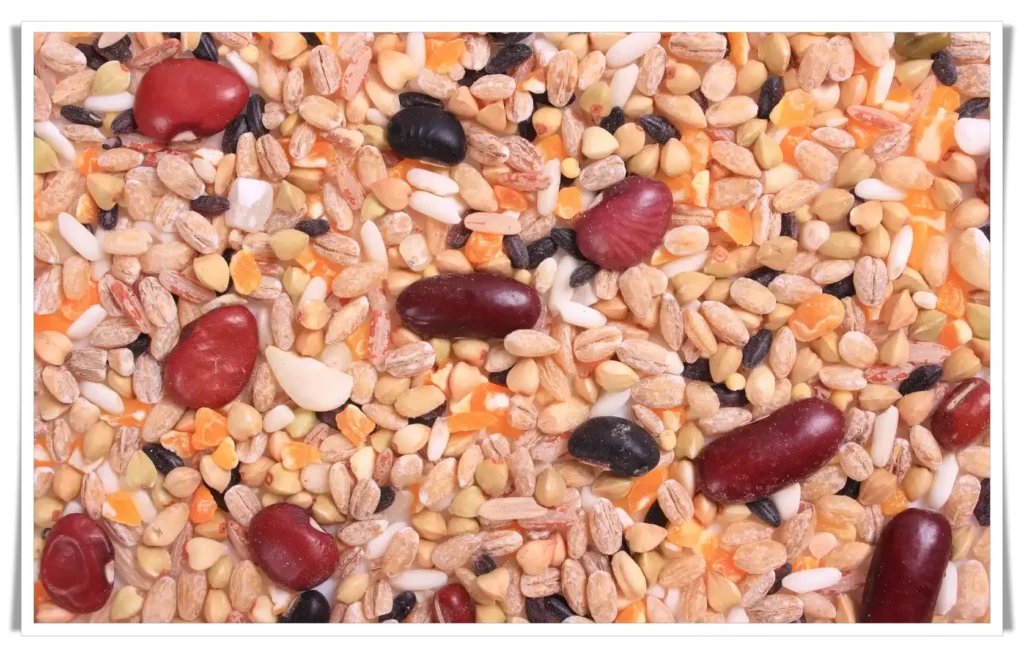
What Are Vitamins?
Folic acid, or B9, is the essential B vitamin for aiding in cell growth and division, especially during pregnancy. This B vitamin is also necessary to make natural chemicals that control the appetite, moods, and quality of sleep. It is also the best B vitamin for helping lower the chances of suffering a heart attack or stroke by keeping the arteries open.
Cobalamin, or B12, is one of the B vitamins that is important in the process of converting carbohydrates, proteins, and fats into energy. This B vitamin is also vital in forming the protective covering of nerve cells and keeping red blood cells healthy and helping prevent heart disease.
Accelerated Health Lessons - Free eBook

What Are Vitamins?
B Complex Vitamins
There is a lot of discussion about the B complex vitamin and how it is essential for the body to perform a multitude of functions. However, the B complex vitamin is not simply one very complicated vitamin, as the name might suggest. There are actually eight B vitamins that are in the B complex vitamin as well as a few other related substances.
The eight vitamins that make up the B complex vitamin are thiamine or vitamin B1, riboflavin or vitamin B2, niacin or vitamin B3, pyridoxine or vitamin B6, cobalamine or vitamin B12, folic acid, pantothenic acid, and biotin. The other related substances that are also in the B complex vitamin include choline, inositol, and para-aminobenzoic acid.
Every part of the B complex vitamin performs its own individual function within the body but it is when they work together as the B complex vitamin that they provide essential maintenance for the body to remain healthy.
What Are Vitamins and What Is Their Role In the Body?
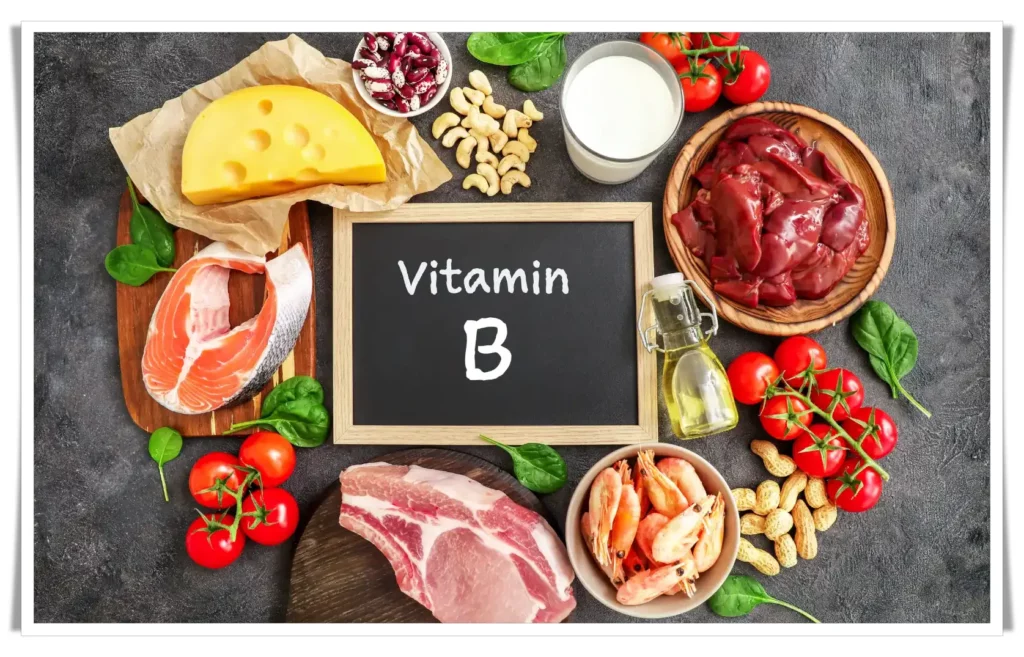
What Are Vitamins?
The B vitamin complex comprises B vitamins which are water soluble and it is essential that enough of these vitamins are consumed on a daily basis. The body cannot store water-soluble vitamins such as the B complex vitamin and this leads to a regular intake being required.
The B complex vitamins are extremely beneficial for a number of conditions and may be needed in additional quantities at certain times in a person’s life. Of course, there is a recommended daily allowance for the B complex vitamins that varies according to the sex and age of a person. However, doctors and other health professionals have discovered the benefits of increasing the intake of the B complex vitamin to help overcome certain illnesses.
What Are Vitamins and What Is Their Role In the Body?

What Are Vitamins?
Many people suffer from anxiety and stress at one time or another and research has found that the B complex vitamin can be beneficial in helping alleviate the symptoms of anxiety and stress. If a person has been unwell the B complex vitamin can be extremely valuable in aiding the recovery process. Fatigue can be a symptom of a multitude of illnesses as well as simply overdoing things but the B complex vitamin can help alleviate general tiredness and lethargy.
Interestingly, some skin conditions, such as dermatitis, can also benefit from additional B complex vitamin intake. In fact, a number of creams and other skin preparations contain added vitamin B complex that can be absorbed by the skin to alleviate the condition. The condition of a person’s hair will also be greatly improved with sufficient B complex vitamin intake.
Good Food Health Vitamin Intake
It is essential that a person is aware of what constitutes good food health and vitamin intake. The federal drug administration produces a recommended daily allowance for the majority of vitamins which it regards as a good food health vitamin intake. These figures vary according to a person’s age, sex, and some other factors so the good food health vitamin intake for a young woman is going to be different from that of a man in his seventies.
What Are Vitamins and What Is Their Role In the Body?
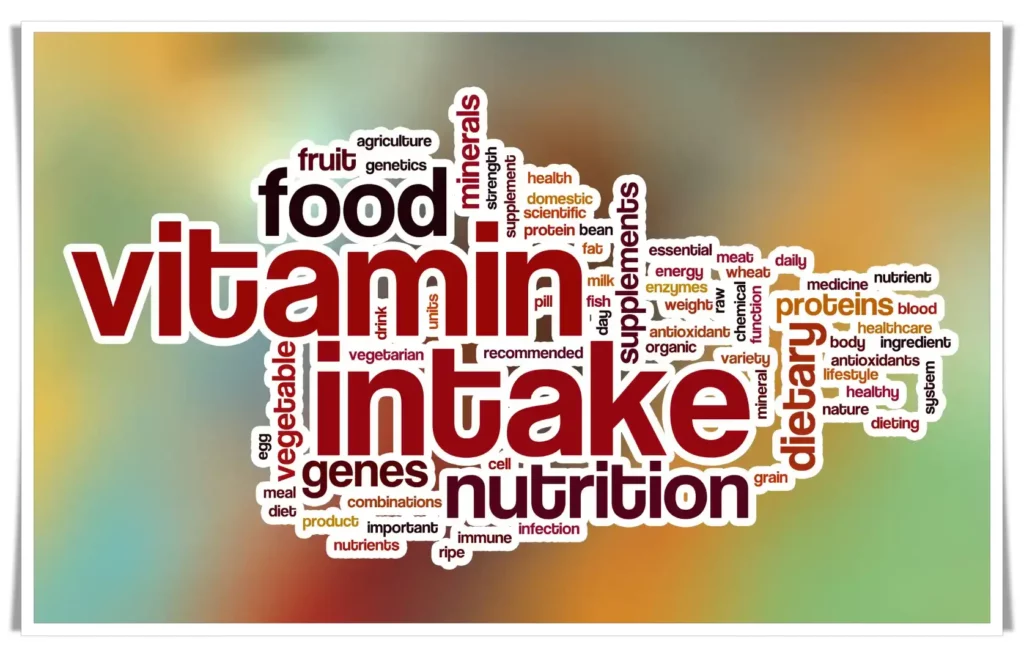
What Are Vitamins?
The food health vitamin intake amounts of certain foods are included in the nutritional labeling. This labeling is important for a person to consider and helps ensure that they are receiving the correct food health vitamin intake from the foods that they eat. The nutritional information is often represented as a percentage of the recommended daily allowance of each vitamin and mineral and can help assess the value of the foods in the quest for good food health vitamin intake.
There are also a number of items that a person may want to restrict in their diet as part of their good food health vitamin intake. Again, the nutritional labeling of certain foods can help a person to see how high a product is in these undesirable contents. Salt and fat, for example, maybe items that a person wants to consider limiting as part of their good food health vitamin intake even though they are not strictly vitamins.
The majority of people actually refer to nutrients when they use the word vitamin and food manufacturers are aware that a person is looking at minerals and other items when they are considering their good food health vitamin intake. Fiber is another element that many people are more aware of as forming an essential part of a balanced diet and is necessary for good food health and vitamin intake.
What Are Vitamins and What Is Their Role In the Body?

What Are Vitamins?
If a person is on a restricted diet for any reason then they need to pay even more attention to their good food health and vitamin intake. Obviously, some foods contain different nutrients from others and this is applicable to vitamins as well it may be more difficult for a person to achieve good food health vitamin intake if they are unable to eat certain foods. Vitamin supplements can form an essential part of a good food health vitamin intake for people who are unable to obtain their vitamins from their normal diet. It is also worth remembering that the good food health vitamin intake for a person varies throughout their life depending on their general health.
Greatest Vitamin Sources
There is a lot of debate as to what the greatest vitamin actually is. Each vitamin has its own essential functions that contribute to a person’s general health and well-being. It is impossible to actually state that one of these is the greatest vitamin. However, there are a number of foods that provide the greatest vitamin quantities.
What Are Vitamins and What Is Their Role In the Body?

What Are Vitamins?
The greatest vitamin sources vary for each vitamin. It is important to have a balanced diet to ensure that the required amounts of each vitamin are obtained. However, it may be useful to list the greatest vitamin sources for each vitamin to be used as a guide.
- The greatest vitamin A sources are milk, eggs, butter, yellow fruits & vegetables, dark green fruits & vegetables, liver
- The greatest vitamin B1 sources are brewer’s yeast, whole grains, blackstrap molasses, brown rice, organ meats, egg yolk
- The greatest vitamin B2 sources are brewer’s yeast, whole grains, legumes, nuts, organ meats, blackstrap molasses
- The greatest vitamin B3 sources are lean meats, poultry & fish, brewer’s yeast, peanuts, milk, rice bran, potatoes
- The greatest vitamin B4 sources are egg yolks, organ meats, brewer’s yeast, wheat germ, soybeans, fish, legumes
- The greatest vitamin B5 sources are organ meats, egg yolks, legumes, whole grains, wheat germ, salmon, brewer’s yeast
- The greatest vitamin B6 sources are meats, whole grains, organ meats brewer’s yeast, blackstrap molasses, wheat germ
- The greatest vitamin B7 sources are egg yolks, liver, unpolished rice, brewer’s yeast, sardines, legumes, whole grains
- The greatest vitamin B8 sources are whole grains, citrus fruits, molasses, meat, milk, nuts, vegetables, brewer’s yeast
- The greatest vitamin B9 sources are dark-green leafy vegetables, organ meats, root vegetables, oysters, salmon, milk
- The greatest vitamin B12 sources are organ meats, fish, pork, eggs, cheese, milk, lamb, bananas, kelp, peanuts
- The greatest vitamin B13 sources are root vegetables, liquid whey
- The greatest vitamin B15 sources are brewer’s yeast, rare steaks, brown rice, sunflower, pumpkin & sesame seeds
- The greatest vitamin B17 sources are whole kernels of apricots, apples, cherries, peaches, plums
- The greatest vitamin C sources are citrus, cabbage family, chili peppers, berries, melons, asparagus, rose hips
- The greatest vitamin D sources are salmon, sardines, herring, milk, egg yolk, organ meats, sprouted seeds, sunflower seeds
- The greatest vitamin E sources are cold-pressed oils, eggs, wheat germ, organ meats, molasses, sweet potatoes, nuts
- The greatest vitamin F sources are vegetable oils, butter, sunflower seeds
- The greatest vitamin K sources are green leafy vegetables, egg yolks, safflower oil, blackstrap molasses, cauliflower
- The greatest vitamin Q sources are pinto beans, legumes, soybeans
- The greatest vitamin T sources are sesame seeds, raw seeds, butter, egg yolk
- The greatest vitamin V sources are raw cabbage, sauerkraut, and leafy vegetables.
What Are Vitamins and What Is Their Role In the Body?

What Are Vitamins?
Healthy Hair Vitamins
There are a number of different specific hair vitamins and minerals that can play a major role in helping a person have a healthy head of hair. If a person does not have sufficient hair vitamins then the deficiencies can lead to thinning hair or even total baldness in the most severe cases. The fact is that the state of a person’s hair reflects the overall condition of their body. Extra hair vitamins are likely to be needed if a person is generally unwell or is undernourished as their hair will show damage too and may even stop growing.
What Are Vitamins and What Is Their Role In the Body?

What Are Vitamins?
Some of the most important hair vitamins that a person needs to have healthy hair include B6, biotin, inositol, and folic acid. The best way to ensure that a person receives enough of these essential hair vitamins is for them to be taken as vitamin supplements. It is not just hair vitamins that are necessary for healthy hair though as there are a number of minerals that are essential, including magnesium, sulfur, silica, and zinc.
The most essential hair vitamin is vitamin a but the best form of this to include in the diet is beta-carotene. This is because hair vitamin A can be toxic if consumed in large quantities but beta-carotene has no such problems and is converted by the body into vitamin A that can be used to promote healthy hair. Of course, vitamin A is not just a hair vitamin, it is also needed for a number of other functions including normal growth of bones, skin, nails, and the protective sheath surrounding nerve fibers.
Protein is another essential hair vitamin. This is because hair itself is essentially protein. The amount of this hair vitamin that a person consumes in their diet can affect the hair directly. If a lot of protein is included in a person’s diet then this hair vitamin will lead to improved hair growth and a far fuller head of hair. However, a person who has a diet that is lacking in this hair vitamin will suffer from thinning hair and slow hair growth.
What Are Vitamins and What Is Their Role In the Body?

What Are Vitamins?
Of course, it is not just hair vitamins and minerals that are needed to ensure that a person has healthy, strong hair. There are a number of researchers who have found that there are direct links between the overall health of a person and the condition of their hair. If a person is under a lot of stress or suffers from a lack of sleep then their hair is also likely to suffer and it is likely that their diet will not provide enough hair vitamins to counter these effects. Hair vitamin and mineral supplements can be the solution to weak and damaged hair.
Conclusion - What Are Vitamins?
Vitamins are essential nutrients that the body needs in small amounts to maintain good health. They play important roles in maintaining the immune system, growth and development, and overall well-being. There are 13 essential vitamins that the body needs, and these can be obtained through a balanced diet or supplements. However, it is important to consult a healthcare professional before taking any vitamin supplements, as excessive intake of some vitamins can be harmful. Overall, vitamins are an important aspect of a healthy lifestyle and crucial for maintaining optimal health.
If you have questions or want to comment, please leave them below and I will answer as soon as I can. Thank you for reading 'What Are Vitamins and What Is Their Role In The Body?''





Please tell me more about your excellent articles
I enjoyed reading your piece and it provided me with a lot of value.
Thanks for posting. I really enjoyed reading it, especially because it addressed my problem. It helped me a lot and I hope it will help others too.
Thank you for your post. I really enjoyed reading it, especially because it addressed my issue. It helped me a lot and I hope it will also help others.
Your articles are extremely helpful to me. May I ask for more information?
I really appreciate your help
You’ve the most impressive websites.
Thank you so much!
Because the admin of this web site is working, no
question very shortly it will be well-known, due to its quality contents.
Can you be more specific about the content of your article? After reading it, I still have some doubts. Hope you can help me.
Your article helped me a lot, is there any more related content? Thanks!
Thank you! I’ll try to post another article soon.
Can you be more specific about the content of your article? After reading it, I still have some doubts. Hope you can help me.
Wow, awesome weblog format! How lengthy have you been running a blog
for? you made running a blog look easy. The full glance
of your website is wonderful, let alone the content material!
You can see similar: sklep internetowy and here
dobry sklep
It’s amazing in favor of me to have a web site,
which is valuable in support of my experience. thanks admin I saw similar
here: e-commerce and also here:
sklep online
Admiring the time and energy you put into
your site and detailed information you present. It’s good
to come across a blog every once in a while that isn’t the same unwanted rehashed material.
Fantastic read! I’ve bookmarked your site and I’m adding your RSS feeds to my
Google account. I saw similar here: Sklep online